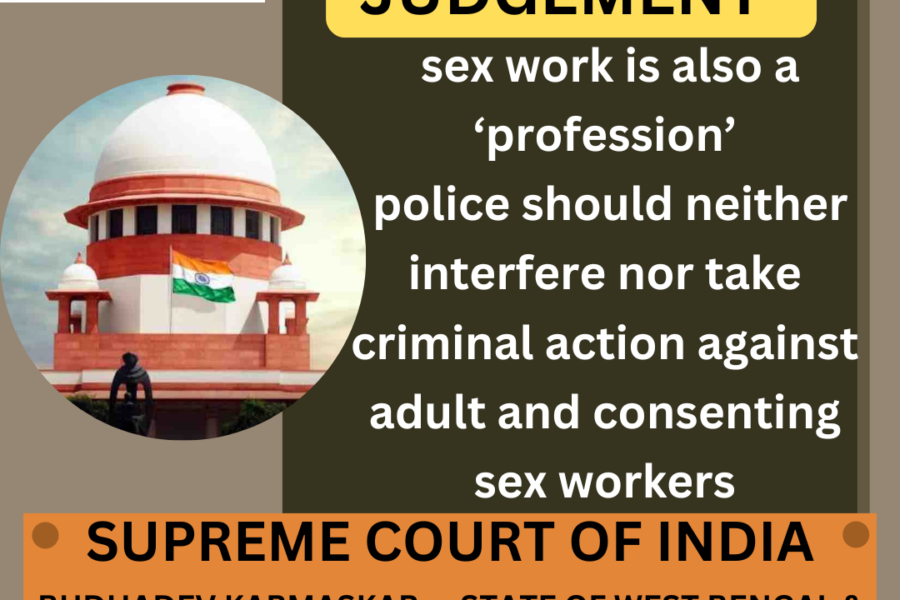The heinous murder of a sex worker in the case of Budhadev Karmaskar v. State of West Bengal (supra) has paved the way for the struggles of sex workers to surface. The Supreme Court has taken a landmark decision to eliminate those problems and provide them with the fundamental rights they were deprived of.
BUDHADEV KARMASKAR v. STATE OF WEST BENGAL & ORS
Criminal Appeal No(s).135/2010
The Indian Supreme Court rendered a historic ruling in the Budhadev Karmaskar v. State of West Bengal case in 2011. The West Bengal Prevention of Immoral Trafficking Act, 1950, Section 8, which made it illegal to solicit people and support oneself on the proceeds of prostitution, was challenged in court. A group of advocates and sex workers filed the lawsuit, claiming that Section 8 infringed upon their fundamental rights. The West Bengal Prevention of Immoral Trafficking Act, 1950, stipulated in Section 8 that anyone who encourages or solicits someone to become a prostitute or who relies entirely or partially on prostitution income is subject to legal action. The following was the penalty for such offences: imprisonment and fines.
In the lawsuit, it was argued that Section 8 was unconstitutional since it infringed upon the Indian Constitution’s Article 21 right to life and dignity. The petitioners claimed that Section 8 violated their right to a living wage and their right to be treated with dignity by making sex workers criminals.
Facts of the case
On September 17, 1999, Budhadev Karmaskar attacked Chaya Rani Pal, also called Buri, in a Kolkata red-light district. When the girl fell to the first floor, she broke eleven bones in her face. Karmaskar departed after the residents rose up in rebellion. Asha Khatun was one of the witnesses to the incident. After being brought to the Medical College Hospital, Buri died there. The man was apprehended by police on Jogen Dutta Lane at around two in the morning.
Budhadev Karmaskar, the appellant in this case, was accused of committing a terrible crime. The trial court sentenced him to death after finding him guilty of raping and killing a little girl. The case went through multiple appellate rounds before the Indian Supreme Court took it on.
Issues
➔ Is prostitution legal in India?
➔ Do they have equal protection of the law as in equal human rights?
Arguments by the appellant
- The learned counsel contended that Asha Khatun’s testimony during the examination-in-chief could not be used as evidence under Section 164 of the Code of Criminal Procedure, 1973, since she did not attend the cross-examination.
- Moreover, it was asserted that no witnesses from the area where the incident occurred were called. For this reason, the learned attorney planned to refute the prosecution’s account of events.
Arguments by prosecution
- The physician who performed the post-mortem stated that eight of the victim’s eleven severe injuries were sufficient to induce death in the normal course of nature.
- The victim was determined to have died when she arrived at the hospital by the same doctor who evaluated her at the medical college hospital.
Judgement
The Hon’ble High Court of Calcutta dismissed the appeal, rejecting the appellant’s argument that the eyewitness’s testimony should not be exposed to cross-examination. The court found that the accused caused enough severe injuries to cause the deceased to pass away.
A three-judge court that found in favour of sex workers declared that prostitution is legal in India and that they should have equal legal protection under the law. The police do not prosecute adult and consenting sex workers criminally in any way.
The central and state governments were recommended to create such training programmes for sex workers so that their future reintegration into society would be facilitated.
This recommendation was put up by a committee that was formed in 2011 and submitted in 2016, but no real action was taken.
Because of this, the Supreme Court issued directives for sex workers and used the inheritance power granted by Article 142 of the Constitution.
The following are the Supreme Court’s main directions:
➢ Equal protection of the law
➢ Right against harassment
➢ Non-disclosure of the identity
and further asked the federal and state governments to seek the development of any kind of legislation suitable for sex workers or protective of them.
To support sex workers’ social reintegration, the Supreme Court further mandated that the Unique Identification Authority of India (UIDAI) issue Aadhar cards to them without requiring them to present proof of residency.
Adv. khanak sharma (D\1710\2023)

